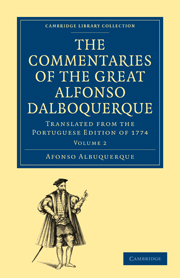 The Commentaries of the Great Afonso Dalboquerque, Second Viceroy of India
The Commentaries of the Great Afonso Dalboquerque, Second Viceroy of India Book contents
- Frontmatter
- Contents
- INTRODUCTION
- CHRONOLOGY OF PART II
- TITLE TO THE EDITION OF 1774–PART II
- TITLES OF THE CHAPTERS CONTAINED IN THE SECOND PART
- MAP OF INDIA
- PART II WHEREIN ARE CONTAINED THE DEALINGS OP THE GREAT AFONSO DALBOQUERQUE WITH THE VICEROY: AND WHAT HE DID AFTER BEING INVESTED WITH THE GOVERNMENT OF INDIA, UNTIL THE FIRST TAKING OF GOA
- Plate section
INTRODUCTION
Published online by Cambridge University Press: 05 July 2011
- Frontmatter
- Contents
- INTRODUCTION
- CHRONOLOGY OF PART II
- TITLE TO THE EDITION OF 1774–PART II
- TITLES OF THE CHAPTERS CONTAINED IN THE SECOND PART
- MAP OF INDIA
- PART II WHEREIN ARE CONTAINED THE DEALINGS OP THE GREAT AFONSO DALBOQUERQUE WITH THE VICEROY: AND WHAT HE DID AFTER BEING INVESTED WITH THE GOVERNMENT OF INDIA, UNTIL THE FIRST TAKING OF GOA
- Plate section
Summary
Por terra jaz o Emporio do Oriente,
Que do rigido Affonso o ferro, o raio
Ao grão Filho ganhou do grão Sabaio,
Envergonhando o Deos armipotente.
Cahio Goa, terror antigamente
Do Naire vão, do pérfido Malaio,
De barbaras Nações…ah! que desmaio
Apaga o Marcio ardor da Lusa Gente.
Oh Seculos de Heróes! Dias de Gloria!
Varões excelsos, que, a pezar da Morte,
Viveis ua tradição, viveis na Historia!
“Albuquerque terrivel, Castro forte”,
Menezes, e outros mil, vossa memoria
Vinga as injúrias, que nos faz a Sorte.
MANOEL MAEIA DE BAKBOSA DU BOOAQE, Sonetoxxix.
In the Introduction to the first volume of my translation of the Commentaries of the Great Afonso Dalboquerque, I reserved for a future occasion some account of the foundation, rise, progress, and decay of the Portuguese Empire in the Eastern Indies, and some Bibliographical notes in reference to the Indian Cycle of Portuguese Literature, because these two great subjects could hardly be treated with due consideration in that volume. In the course of my remarks upon these points, which must necessarily be very limited even here, I shall incorporate a brief out line of the exploits of our hero Afonso Dalboquerque, so far as they are put before the reader now for the first time in their English form, that is, down to the first and unsuccessful attack upon the most important position ever held by the Portuguese in the great Indian Continent, viz., the fortress and Island of Goa, and to this I shall add some description of the settlement itself, gathered from such works as treat of this subject.
- Type
- Chapter
- Information
- The Commentaries of the Great Afonso Dalboquerque, Second Viceroy of IndiaTranslated from the Portuguese Edition of 1774, pp. xi - cxxiiiPublisher: Cambridge University PressPrint publication year: 2010First published in: 1877


